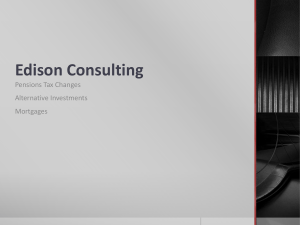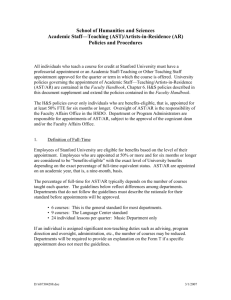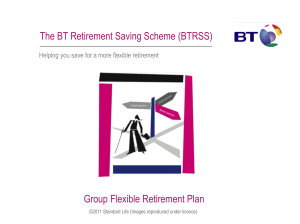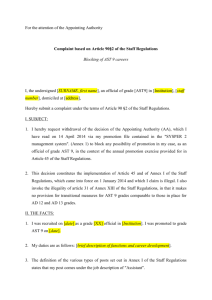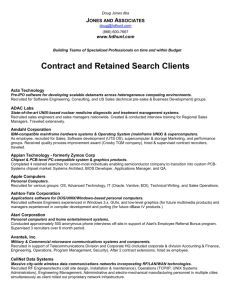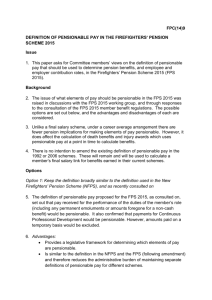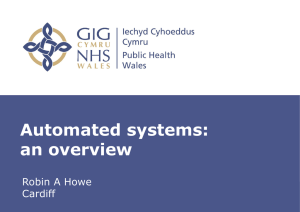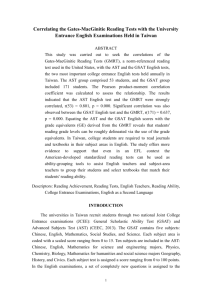Reform of Staff Regulations - CONF
advertisement
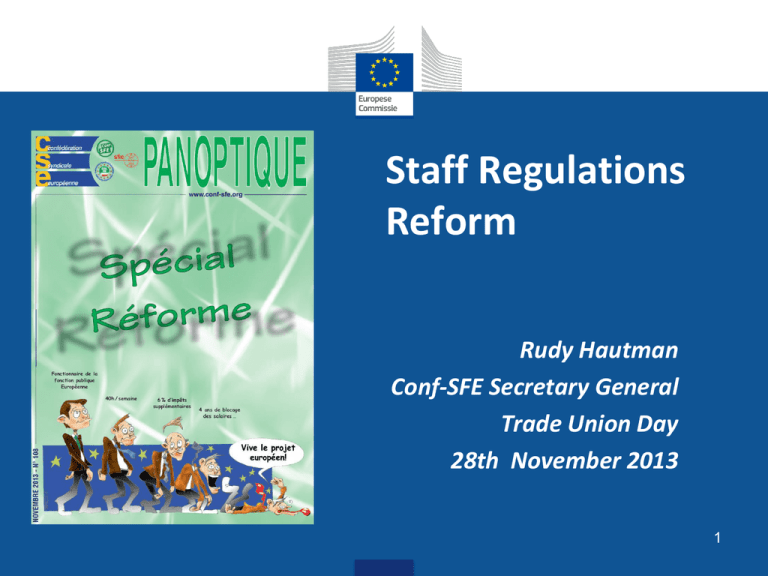
Staff Regulations Reform Rudy Hautman Conf-SFE Secretary General Trade Union Day 28th November 2013 1 Background • • • • • • Commission proposal in December 2011 Several informal 'trilogue' meetings. The JURI Committee of the EP endorsed it The COREPER reached agreement on the compromise text. The EP adopted its position with a majority of 552 votes in favour. The amendment to the Staff Regulations has now been published as Regulation (EU, EURATOM) No. 1023/2013 in the Official Journal No. L 287, 29.10.2013 • Lack of staff consultation: only at proposal stage; goes against Charter of fundamental rights, most probably Court cases. 2 Method - 1 • Principle of parallelism. • Use a sample increased to 11 Member States (+AT,PL and SE) • National price indices for Belgium and Luxembourg , instead of Brussels International Index (expatriates) to measure the costs of living. • The moderation clause moderates the impact of an increase or decrease in purchasing power of more than 2% per year. Part over 2% postponed for 9 months • The crisis clause would address the situation if there is a drop in the EU GDP under 0%. A part of the gain in purchasing power would be postponed to the following year. 3 Method - 2 • The method will be suspended for two years, i.e. in 2013 and 2014. • The salary and pension updates would take place automatically on the basis of values calculated by Eurostat (no legislative procedure). • Applies until 31.12.2023. • The solidarity levy will be increased to 6% and for staff in grades AD15 step 2 and above, the rate will be 7%. • The levy will not apply to pensions or allowances. • Amount AST1/1 exempted 4 Judgment in Cases C-63/12, C-66/12 and C196/12 (Commission v Council, Council v Commission, Commission v Council) Bad news!!! • The Council was entitled to reject the Commission’s proposal, based on the ‘adjustment method’, intended to increase the salaries and pensions by 1.7% in 2011 • The Court of Justice rules that it was the task of the Council and not the Commission to determine whether or not there was a serious and sudden deterioration in the economic and social situation such as to trigger, if necessary, the exception clause. • The European Commission is required to submit to the European Parliament and the Council new proposals which take into account the serious and sudden deterioration in the economic and social situation identified by the Council in 2011. 5 Career structure - AD • Heads of Unit, Advisers and staff members in equivalent positions will be able to progress until AD 14. • Other administrators will be able to progress to AD 12 via the normal promotion exercises. The maximum rate for promotions to these grades will be 15% per year. • Access to AD13 and AD14 will be possible via a selection procedure. This means that grades AD 13 and AD 14 remain accessible for non-management staff. • Transitional measures • Two new post types: current AD 13 and AD 14 who are not HoU nor Advisor become "(Senior) Administrator in transition". • Two notional steps will be added in grades AD 12 and AD 13 (2,8% and 1,4%). 6 AD Careers and performance • • • • • • • • • • • • Multiplication rates for guiding average career: rates revised for entry grades and AD12 and AD13 grades Grade Administrators 13 15% 12 15% 11 25% 10 25% 9 25% 8 33% 7 36% 6 36% 5 36% 7 Career structure - AST • AST 9 will have access to AST 10 and 11 grades only after passing a selection procedure. • Current AST 10/11 “(Senior) Assistant in transition”. • A new function group "AST/SC" (comprising six grades) for secretarial and clerical staff will be established. • The requirement for a minimum of two years in the grade before promotion of an official to the next higher grade is maintained. 8 Grade Transitional measures AST Transitional measures, with effect from 1 January 2014, will be put in place for AST staff recruited before 1 January 2014: except for "ex-C" or "exD" officials recruited before 1 May 2004 who have not been attested, AST staff in place can be promoted to grade AST 9 and will be placed in the “Assistant in transition” or “Senior Assistant in transition” category, depending on their current grade ex -D non attested ex -C non attested 1 1 Oth er (ex-B, attested AST post 2004) Senior Assistant in transition 1 0 9 8 7 6 Assistant in transition Administrative assistant in transition 5 4 3 Support agent in transition 2 1 9 Pension age • • • • 66 if recruited after 1 January 2014. 63-65 if recruited after 1 May 2004. 60-65 if recruited before 1 May 2014. Staff in place before 1 January 2014: transitional provisions depending on age • • • • Examples on the next slide 65 if recruited before 1 January 2014 and less than 35 years on 1 May 2014 63 if recruited between 1 May 2014 and 31 December 2013 and aged 45 years on 1 May 2014 pension age is 63 years 67 in interest of service, exceptionnally until 70 10 Age on 1 May 2014 60 years and above Transitional provisions Pensionable age Age on 1 May 2014 Pensionable age 60 years 47 years 62 years 6 months 59 years 60 years 2 months 46 years 62 years 8 months 58 years 60 years 4 months 45 years 62 years 10 months 57 years 60 years 6 months 44 years 63 years 2 months 56 years 60 years 8 months 43 years 63 years 4 months 42 years 63 years 6 months 55 years 61 years 54 years 61 years 2 months 41 years 63 years 8 months 53 years 61 years 4 months 40 years 63 years 10 months 52 years 61 years 6 months 39 years 64 years 3 months 51 years 61 years 8 months 38 years 64 years 4 months 50 years 61 years 11 months 37 years 64 years 5 months 49 years 62 years 2 months 36 years 64 years 6 months 11 Pension bonus • Staff recruited before 01/01/2004 AND aged over 50 y or 20 y service on 1 May 2004 • • Staff recruited before 01/01/2014 • • From 60 you have a 5% increase of pension rights required at 60 From your pensionable age: increase by 2,5% of the final basic salary Staff recruited after 01/01/2014 • From 66: increase by 1,5% of the final basic salary 12 Pension - the accrual rate • 1.8% per year of service for officials recruited after 1 January 2014 (38,8 years for full pension) • 1.9% for staff recruited between 1 May 2004 and 31 December 2013 • 2% for those recruited earlier 13 Early retirement • Possible from the age of 58 (currently 55) with a reduction of pension rights of 3.5% for each year • Transition provisions will apply to staff in place • • • • • Staff recruited from 01/01/2014 • • Between 60 and pensionable age -1,75% From 01/01/2014 to 31/12/2015 between 55 and 60 : -3,5% From 01/01/2016 to 31/12/2016 between 57 and 60 : -3,5% From 01/01/2017 between 58 and 60 : -3,5% Between 58 and 66 : -3,5% Early retirement without reduction of pension rights will no longer be possible. 14 Leave in the interests of the service • • For organizational needs linked to the acquisition of new competencies Decision by AIPN • Conditions • • At the earliest 5 years before pensionable age At least 10 years of service • Number limited to 5% of retired officials in previous year • Monthly allowance progressively reduced from 100 to 70% of basic salary till pensionable age • Early retirement without reduction of pension rights will no longer be possible. 15 New promotion rates • 7 years for AD 12 to 13 (from 25 to 15%). • 7 years for AD 13 to 14 (from 25 to 15%). • 2 years and 9 months for AD5, AD6 and AD7 (from 33% to 36%). • 12,5 years for AST 9 to 10 (from 20 to 8%). • • • • • 4 years from SC1 to SC2 5 years from SC2 to SC3 6 years from SC3 to SC4 7 years from SC4 to SC5 8 years from SC5 to SC6 16 Performance Management • You still need – as in the past – minimum 2 years in the grade for promotion. • You still need – as in the past – minimum 2 years for advancement in the step BUT if unsatisfactory performance advancement is suspended to 3 or 4 years. • When comparing merit in the promotion process, the level of responsibility will be systematically taken into account, in the same way as the appraisal reports and the use of languages (currently the level of responsibility is only considered "when appropriate"). • Explicit reference to the annual appraisal and report on the performance of staff will be enshrined in the Staff Regulations. The report shall include a statement on whether or not the performance of the official has been satisfactory. • • Three consecutive unsatisfactory reports: downgraded by one grade. If the following two annual reports still show unsatisfactory performance: dismissed. 17 Contract staff and temporary staff in Agencies • Contract Agents (3b) extended from 3 years to 6 years. • Contract staff in function groups II, III and IV may be allowed to take part in internal competitions, subject to two conditions: • • • • • • after three years of service in the Institution; and laureates from contract staff will not exceed 5% of total appointments in that grade and function group. FG II can do SC1/2 competition FG III can do AST 1/2 FG IV can do AST1/4 or AD 5/6 In order to give the Agencies greater flexibility as regards the various committees that shape the social dialogue or that must be consulted before a decision is taken, common committees for two or more agencies can be set up. 18 Contract staff and temporary staff in Agencies • A new category of temporary staff (TA2f) for Agencies has been introduced. • • Explicit reference to selection procedure in the SR; • • • Limited range of recruitment grades SC1 and SC2, AST1 to AST4 and AD5 to AD8 In duly justified cases, at grade AD9,10 11 or exceptionally AD12 Reclassification • • Specific rules for this category have been defined to address the Agencies' needs and to ensure a more consistent staff policy in these bodies. Promotion rates in Annex I.B Enhanced mobility • • Keep your grade and step when moving to another Agency Temporary staff can be seconded to other bodies, in the interests of the service 19 Agencies – implementing rules and committees • • • Harmonised implementation of the Staff Regulations: Commission's implementing rules shall apply by analogy also to the Agencies To take account of their particular circumstances, Agencies will be entitled to request the Commission's authorisation to adopt implementing rules which deviate from those of the Commission • • Committees to be established: Common committees for two or more Agencies can be set up to increase flexibility as regards the various internal bodies that shape the social dialogue or that must be consulted before a decision is taken 20 Working time • 40 hours per week, without compensation. • Exception 38 hours per week, in cases of serious hardship, staff with children under 14 years • Explicit reference to flexitime arrangements will be enshrined in the Staff Regulations. • Flexitime recovery will not be granted in full working days for officials in grades AD/AST9 or higher. Recovery of half days remains possible. • Senior and middle managers, who will manage their working time in agreement with their superiors. 21 Working conditions - Leave entitlements • The annual travelling time • Annual payment of travel expenses • • Abolition of travel expenses for those who do not receive an expatriation allowance. Leave on personal grounds • Rules on the reimbursement of removal costs • • • • will be replaced by home leave a maximum of 2.5 days for every expatriate official based in the EU for staff based outside the EU the number of days is decided by the AIPN) will be rationalised by basing it on geographical distance between the official's place of employment and his place of origin • will be limited to 12 years (instead of 15) • will be simplified: the cost ceilings which take account of the official's or agent's family situation and of the average cost of removal and associated insurance will be introduced 22 Staff in Delegation • Annual leave of 2 working days for each month of service, instead of the current 3.5 days. • The gradual decrease will take place in 2014 (3 days) and 2015 (2.5 days). • Official additional rest leave to take account of particularly difficult living conditions is maintained untouched. • Use a wider range of parameters to fix the allowance for living conditions. • The conditions for granting the accommodation allowance will take better account of local situation. The allowance will be paid either as a flat-rate or reimbursement of rent. • Annual travel in economy class. 23 Allowances and other conditions • The annual travelling time • “home leave”, limited to a maximum of 2,5 days instead of 6 • Annual payment of travel expenses will be rationalized by basing it on geographical distance(previously based on railway kilometers). • Staff in Delegations • Annual leave of 2 working days for each month of service instead of the current 3.5 days. • Either a flat-rate allowance will be paid or a reimbursement of rent will be provided. • Annual flat rate payment for travel expenses to the place of origin will be based on cost of air travel in economy class instead of business class. • Reimbursement of removal costs will be simplified: cost ceilings and the average cost of removal and associated insurance will be introduced. • Parental leave may be extended for a further 6 months` period in addition to the current 6 months with an allowance reduced by 50%. The periods are doubled for single parents or parents of children with disabilities or serious illness. 24 Conflict of interests - Cooling off period • Check of conflict of interests: • • • • Before recruitment the Appointing Authority will examine the candidate's dependence and absence of any conflict of interest. The candidate will fill a specific form, stating any actual or potential conflict of interest. If necessary, appropriate measures (applies also to officials returning after leave on personal grounds). Cooling-off periods for senior officials: • • • Explicit prohibition for senior officials to engage in lobbying or advocacy vis-à-vis the staff of their former Institution on matters for which they were responsible during the last three years in the service in the twelve months after leaving the service Also for leave on personal grounds. 25 Leave on personal grounds Whistleblowing - Transfer of salary • • Leave on Personal Grounds: Prohibition to engage in an occupational activity, whether gainful or not, which involves lobbying or advocacy vis-à-vis his institution and which could lead to the existence or possibility of a conflict with the legitimate interests of the institution. • • Whistleblowing: Complaints by officials shall be examined before the expiry of the deadlines set in Article 90 (4 months); The institutions have to adopt internal rules notably on the procedure for handling of complaints and on the protection of the legitimate interests of the whistleblowers. • • Salary can be paid in any bank account in the Union (not necessarily in the place of employment). 26 Geographical balance • Address the present significant imbalance. • A thorough analysis which includes a reliable statistical assessment and a forecast on the likely evolution of geographical balance. • Equal access to the European Civil Service • Multilingualism • Recruitment criteria based on merit. • After three years, the Commission will report to the EP and to the Council. 27 Part time work (art 55 bis and Annex IVa) • • • • • • • to care for a dependent child under 9 years, to care for a dependent child aged between 9 and 12, if the reduction in working time is no more than 20 % of normal working time, to care for a dependent child until he reaches the age of 14 when the official is a single parent. In cases of serious hardship, to care for a dependent child until he reaches the age of 14 if the reduction in working time is no more than 5 % of normal working time. In that case, the first two paragraphs of Article 3 of Annex IVa shall not apply pro rata calculation of salary. In case both parents are employed in the service of the Union, only one shall be entitled to such reduction. serious illness or handicap: spouse, ascendant, descendent, brother sister additional training during the last 3 years before (s)he reaches pensionable age, but not before the age of 58 28 29
